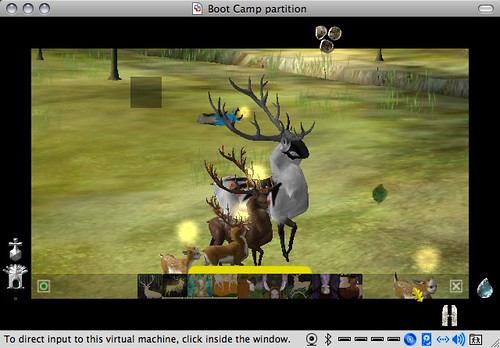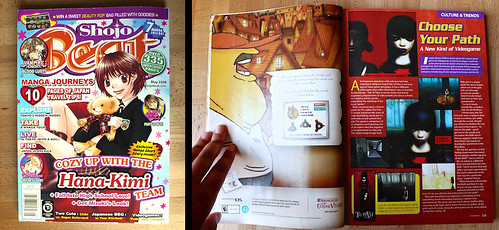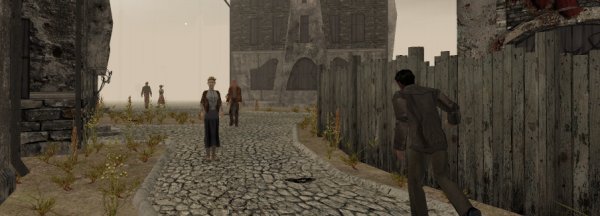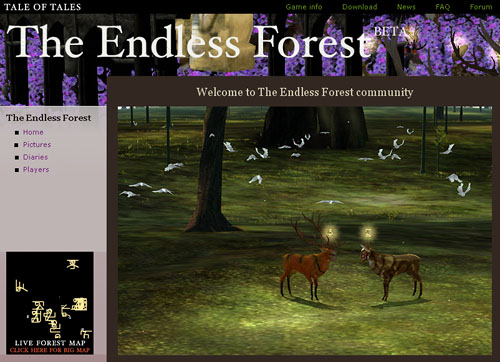The Cube Festival starts today in Issy-Les-Moulineaux, just South of Paris, France. Featuring The Endless Forest, among many other media art projects. The festival runs until 8 June.
Will mobility kill the medium?

Laptop computers are becoming increasingly popular. To my great frustration because they are often underpowered machines, certainly when it comes 3D graphics, and our games require every last bit of performance they can get. But is there something else going on too?
We’ve always been very fond of the intimate nature of desktop computing. One person alone with one computer in the sollitude of their home office. That’s more or less how we imagine the ideal environment for experiencing our work (not unlike a 19th century gentleman going through his secret drawer of lewd pictures). A very intimate situation in which the player can be at ease and concentrate on the work. But as more and more people use laptop computers instead of desktops, this ideal situation will occur less and less. Through becoming mobile, computers also become trivial. Mere accessories to take on the road, for convenience, not media that you actually devote some time to.
Would cinema have been so succesfull, culturally, if it had become mobile before even maturing as a medium? I highly doubt it. It is exactly the demands that cinema makes on the viewer, that give the authors the room required to create their art. Cinema, nor literature, or theatrical or musical performances, are casual media. But if computing becomes mobile, what will be left of it as a medium?
Picture by fabuleuxfab
The Graveyard post mortem, part 2
![]()
We have finished part 2 of our article about the making of The Graveyard. After part one about how the idea was born, now it’s about getting from idea to realisation: funding and technology. Read all about how we get arts funding for our projects and how we found working with Unity3D for the first time in…
The Graveyard: How to make an idea come to life
TEF on Mac almost, again

There is Yet Another Windows Virtualization software. This time one that does NOT require you to install windows on the machine AT ALL! I tried CrossOver a year or so ago but found it lacked any 3d acceleration or DirectX emulation, but now they have a new product available.
CrossOver Games is a fancy, 3d optimized, re-packaging of Wine software emulation. Thus it works for both Mac and Linux to emulate an environment compatible with many PC video games. Read more about this on Joystiq, thats where I first heard of it.
Anyway, my tests with getting The Endless Forest up and running with it were mixed. The GOOD: It does a really fantastic job of running the game! It speeds along at over 30 FPS on my MacBook Pro. Since it doesn’t require a real Windows installation I had it installed and was playing in a matter of minutes. CrossOver Games is alot less expensive than VMWARE or Parallels and since you aren’t buying windows either its a good emulation solution. The BAD: I couldn’t get a network connection  which of course renders the multiplayer experience of TEF unusable. I don’t know if the connection problem with TEF is just a problem with my network or my computer though, so if you try it then let me know what your experience was.
which of course renders the multiplayer experience of TEF unusable. I don’t know if the connection problem with TEF is just a problem with my network or my computer though, so if you try it then let me know what your experience was.
On the upside… It runs Guild Wars flawlessly. So maybe that is some consolation.
The Graveyard post mortem
![]()
We are in the process of writing an article about the making of The Graveyard. We will be publishing each part as we finish it. Starting with Birth of an idea, about the concept of the game, where it came from and why we think it’s relevant. Next is a chapter about finding funding and technology. After that we will discuss the production itself, what went right and what went wrong. Then we will talk a bit about the important contributions of the character animator, the music composer and the sound designer. And we will conclude with an analysis of the distribution, sales, press and audience response to the game.
But first:
The Graveyard: Birth of an Idea
Enjoy!Enjoying horror…
Playing a small student game called Hush (or at least attempting to do so since I suck at any kind of challenge-based gameplay), made me realize how important the fictional aspect is for the enjoyment of horror.
Hush is a game set in Rwanda during the massacres between Hutus and Tutsis. You play a woman who is trying to silence her crying baby so that the invading soldiers don’t find them.
I have a lot of ethical issues with this game (and “news gaming” in general). And I completely disapprove of the confusion it generates between the emotions caused by the gameplay and those by the narrative. But that’s not the point here.
The soundscape of the game is incredibly effective. It’s frightening, it’s shocking. But because it is real, or pertains to a real event, I can’t seem to get the same enjoyment out of it as I might from a similar scene in an actual horror movie or game. In horror fiction, it’s fun to experience the threat of death and pain, to be overpowered by a massive and mysterious force, to be faced with a bleak and hopeless situation. But only, it would appear, within the context of fiction. Experiencing a life threatening situation in real life is not fun at all. Even imagining experiencing a horrific situation that happened for somebody else, is by no means amusing.
And yet we love horror!
Horror is not really about being frightened, is it? Experiencing real fear is not fun. What we experience in horror fiction is not real fear.
Maybe the emotion triggers the release of some chemicals in our brain that, when confronted with a real threat, help our body to respond appropriately. But when in a comfortable situation, these chemicals act like an amusing drug. Maybe all the things we do for entertainment manipulate the chemical reactions that used to be of vital importance to survival and turn them into a source of fun.
But it’s only fun if it’s fake.
TEF on Mac (sort of)
I tried out the public Beta of VMWARE Fusion 2.0 because they boast it has “experimental support for DirectX 9.0 Shader Model 2 3D acceleration” (meaning it actually uses the video card, allowing one to play some 3d games!) I was hoping that it would allow me to run The Endless Forest on the Mac, and it does!

Okay, before we all get excited, this is still in the realm of exotic setups. VMWARE is a software that allows you to install Windows (or use a Boot Camp partition) without having to restart your computer. So you _still_ need to have Windows. Also, even on the MacBook Pro which runs TEF like a dream in Boot Camp, in VMWARE I’m getting 7-9 FPS for TEF. This is… not good. Then again, this is a beta of VMWARE maybe the final version will get the frame rate up? It _could happen… right?
Anyway, for you Mac using, dual Booting, tinkerers out there who are curious about TEF, I encourage you to give it a try and let us know how you fare!
The Path in Shojo Beat!

A little write-up of our game-in-progress appears in the May 2008 issue of Shojo Beat (sister publication of Shonen Jump) manga magazine. Fun magazine! Pleased they found us attractive enough to feature. If you like girls with BIG eyes, this month, in addition to keeping up with “Vampire Knight Blood Lust” you can keep up with us as well. (^__^)
Endless Forest community site is open!
We had been testing the new Endless Forest community website for a few months already. Lots of players had found their way to it. And it’s becoming a really fun place with great artworks and stories created by the community.
So we decided to just give up our perfectionism and open the site as it is, in its beta state.
Have a look:
http://EndlessForest.org
Only players of The Endless Forest can log in and post. But most of the content can be viewed by anyone.
Pathologic

We’ve been wanting to talk about the Russian studio Ice-Pick Lodge for a while now. Their 2005 game Pathologic is truly fascinating, even if it is “broken”, as John Walker put it.
Thanks to Rock Paper Shotgun we can now enjoy the game by proxy, through a grandiose triptych of a review, divided in Body, Mind and Soul.
A good read, especially with the new game, Tension, on the way.
Ice-Pick Lodge is one of those very few studios that make games from a deep artistic motivation. They don’t mess around with clever control schemes or gathering points. They have a story to tell and they use the interactive medium to tell it. Even if that means sacrificing the overrated “fun factor”. If games are ever going to become a mature artistic medium, this is where it’s going to happen.
How I wish Pathologic wouldn’t crash on my PC…

